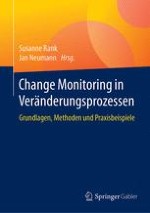
2017 | OriginalPaper | Chapter
1. Change Monitoring – Ziele und Nutzen
Authors : Jan Neumann, Susanne Rank
Published in: Change Monitoring in Veränderungsprozessen
Publisher: Springer Fachmedien Wiesbaden
Activate our intelligent search to find suitable subject content or patents.
Select sections of text to find matching patents with Artificial Intelligence. powered by
Select sections of text to find additional relevant content using AI-assisted search. powered by